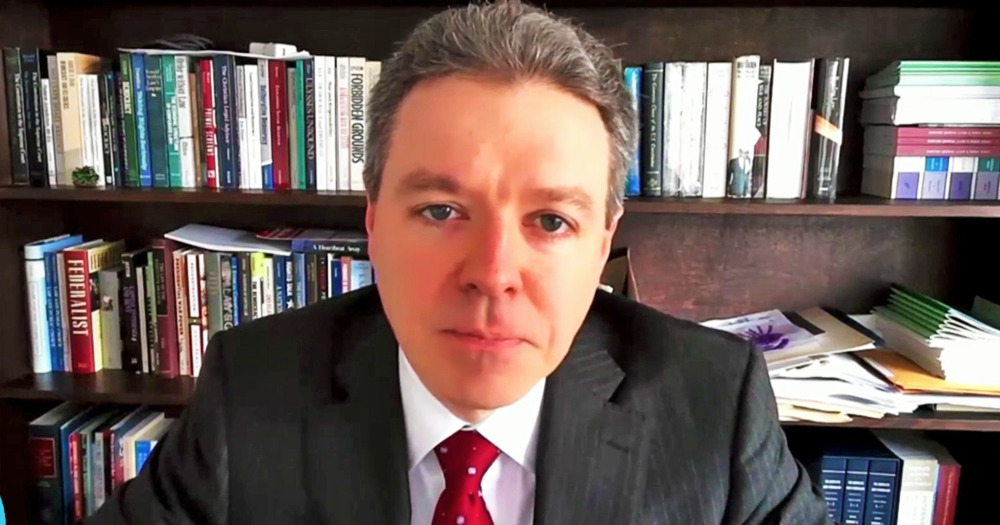

It’s been 10 years since the FDA approved the medication known as PrEP, or pre-exposure prophylaxis, a once-a-day oral medication that prevents the transmission of HIV. It is sold under the brand names Descovy and Truvada and reduces the chances of infection during sex by up to 99% when taken as directed.
The drug has dramatically reduced the number of new infections among gay and bisexual men since it first came on the market, but a new lawsuit filed by attorney Jonathan Mitchell argues insurance companies have the right to refuse to cover the cost of the medication.
Taking Truvada once a day can cost up to $2,000 a month. The Affordable Care Act requires insurance companies to cover the drug, but conservatives like Mitchell are pushing back because it “enables homosexual behavior.”
In the lawsuit Kelley v. The United States of America, the Texas lawyer is representing several clients who say they shouldn’t be forced to provide Descovy and Truvada under the Affordable Care Act.
“The PrEP mandate forces religious employers to provide coverage for drugs that facilitate and encourage homosexual behavior, prostitution, sexual promiscuity, and intravenous drug use,” the lawsuit states. “It also compels religious employers and religious individuals who purchase health insurance to subsidize these behaviors as a condition of purchasing health insurance.”
Experts warn the case could dramatically limit access to life-saving medication.
“The PrEP cases recently filed should alarm us all,” said Richard Albert, a constitutional scholar and professor of law at the University of Texas at Austin. “They suggest that LGBTQ+ rights will come under more intense and more frequent attack now that the court has telegraphed its willingness to revisit hard-won constitutional protections against sexual orientation discrimination.”
The suit is one of many laws and cases recently filed in Texas designed to limit access to healthcare for LGBTQ+ patients. A bill introduced in 2021 would give healthcare providers the right not to treat patients if doing so conflicts with the providers’ religious beliefs. This could include the right to prescribe PrEP or contraception—or even to treat a patient, for example, who had a heart attack but is also transgender.
Mitchell was also behind the state’s abortion ban that lets private citizens sue anyone whom they suspect may have aided and abetted with an abortion. He has also defended a company’s right to fire an employee for being gay.
Experts note that decreasing access to PrEP runs counter to the country’s goal of reducing new HIV infections by 75% by 2025 and by 90% by 2030. The HIV prevention initiative known as “Ending the HIV Epidemic: A Plan for America,” launched in 2019, sets similar goals but with different strategies. Both plans call for increasing access to pre-exposure prophylaxis.
Conservatives could use the same legal strategy that helped overturn abortion in Texas to outlaw homosexual relationships.
Last month, Texas Attorney General Ken Paxton signaled he’s also open to the idea of using the same approach on the state’s sodomy laws.
Reducing access to PrEP would have ramifications beyond the LGBTQ+ community. It would affect anyone that is at risk for HIV.
Studies show black men are four times more likely than white men to contract HIV in Texas. Black women are almost 14 times more likely than white women to contract the virus. Meanwhile, latinos are twice as likely as white men to receive an HIV diagnosis and latinas are nearly four times as likely as white women to test positive for HIV.
Many remote areas of Texas lack access to the drug altogether.
A 2019 study in the American Journal of Public Health referred to these areas as “PrEP deserts.” Without access to the drug, many patients have to drive more than an hour to find the nearest provider. Telehealth has helped more patients access the drug in recent years. They can request a prescription discreetly over the internet without going to the doctor’s office in person.
Texas and the U.S. still have a long way to go when it comes to preventing HIV. An estimated 1,189,700 people reported having HIV in the U.S. in 2019.
Restricting access to drugs that prevent infection would only push the country in the wrong direction.
In a shocking incident on December 4, 2024, Brian Thompson, the CEO of UnitedHealthcare, was…
In an unprecedented step toward financial relief and health equity, the city of St. Paul,…
In early November 2024, a shocking tragedy unfolded in Budapest, Hungary, as American nurse Mackenzie…
If Robert F. Kennedy Jr. were to assume leadership of the U.S. Food and Drug…
On November 1, 2024, federal authorities charged 38-year-old Rebecca Fadanelli, owner of Skin Beaute Med…
In a quaint little restaurant in Echo Park, an up and coming author is sitting…